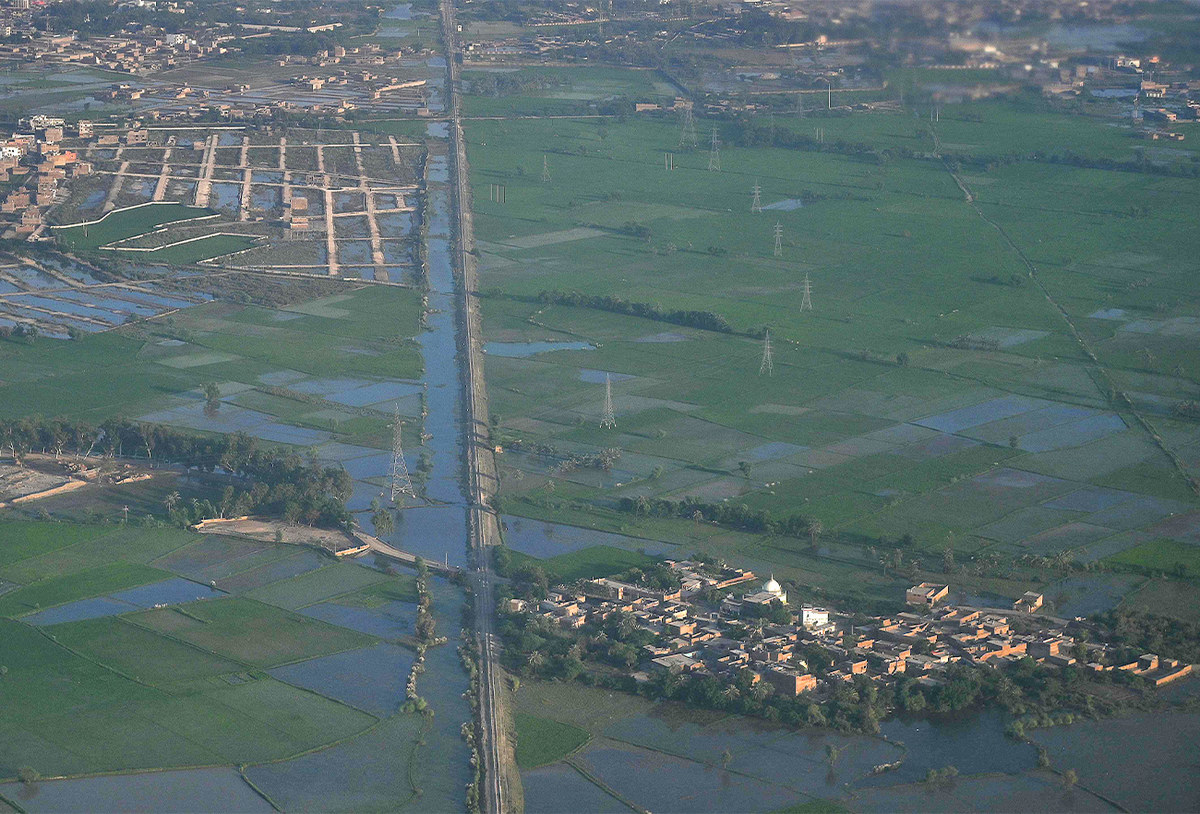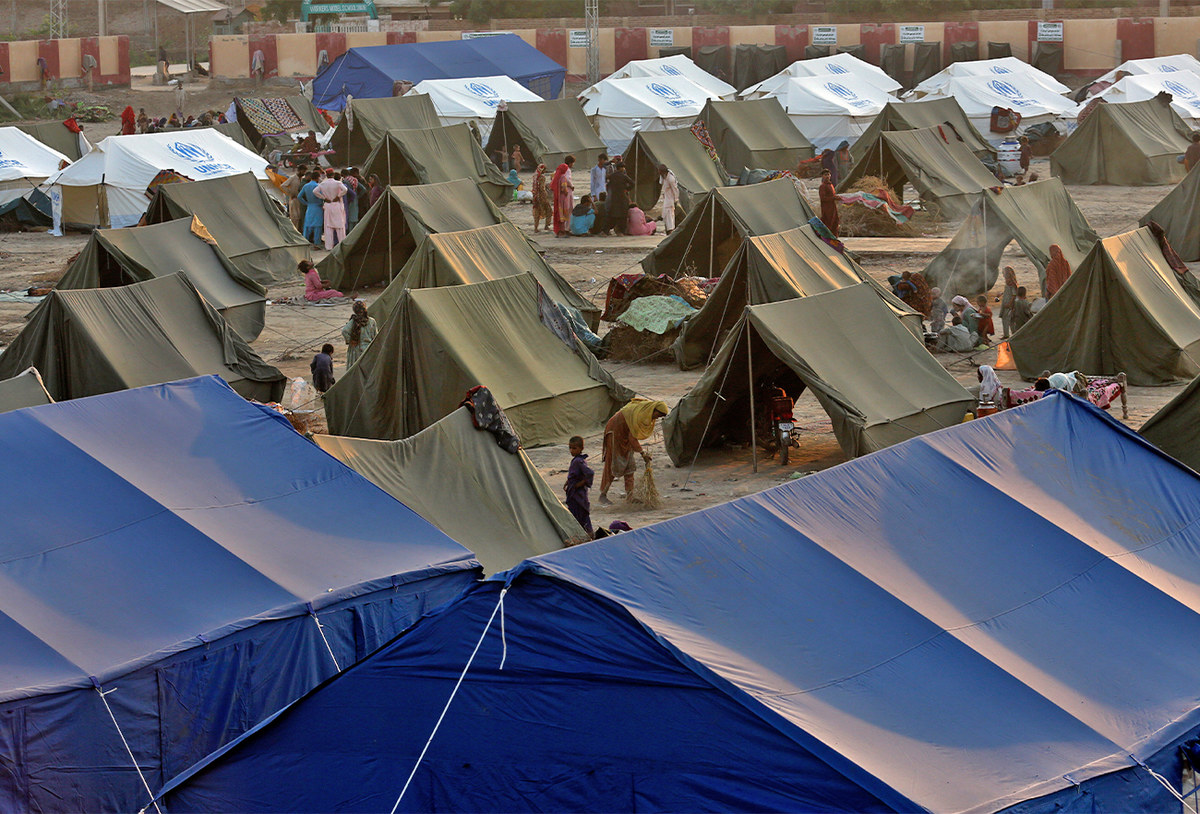ISLAMABAD: On the invitation of the United Nations secretary-general, Prime Minister Shehbaz Sharif will address a special roundtable conference on climate change on the sidelines of the UN General Assembly (UNGA) session to highlight the losses and damages caused by unprecedented floods in Pakistan, the country’s foreign minister said on Saturday.
The 77th session of the UNGA will open on September 13 and the high-level General Debate will begin a week later on September 20.
UN chief António Guterres is currently in Pakistan on a two-day trip to assess damages in the South Asian country, which has been reeling from catastrophic floods that have killed around 1,400 people and affected 35 million since mid-June.
The deadly floods have inundated a third of the country, devastated hundreds of thousands of homes and washed away swathes of standing crops and key infrastructure, with Guterres putting the losses at an estimated $30 billion at a press conference on Friday.
“The UN secretary-general has invited Pakistan to participate in a special roundtable hosted by him on climate change during the UNGA session,” Bhutto-Zardari said, in an exclusive interview with Arab News on Saturday.
“In that roundtable, the prime minister will get a chance to speak about the adverse impacts of climate change on Pakistan and highlight the destruction and damages inflicted by floods caused by climate change.”

Pakistani Foreign Minister Bilawal Bhutto-Zardari speaks to Arab News in an exclusive interview in Islamabad, Pakistan on September 10, 2022. (AN Photo)
Pakistani officials blame the recent devastation on human-driven climate change and say the country is unfairly bearing the consequences of irresponsible environmental practices elsewhere in the world.
Pakistan is eighth on NGO Germanwatch’s Global Climate Risk Index, a list of countries deemed most vulnerable to extreme weather caused by climate change, despite contributing less than 1 percent to global carbon emissions.
Bhutto-Zardari said their message to the world was that these losses and damages did not occur because of the Pakistani people.
“This is an international issue and this all is happening due to the whole world, so we hope that we will come out of this problem collectively with the cooperation of the international community,” he told Arab News.
“We would try to highlight the losses that occurred during these unprecedented floods and also inform them about our immediate and long-term needs for the rehabilitation and reconstruction phase.”

This aerial photograph shows a flooded area on the outskirts of Sukkur, Sindh province, on September 9, 2022. Nearly 1,400 people have died in flooding that covers a third of Pakistan-- an area the size of the United Kingdom -- wiping out crops and destroying homes, businesses, roads and bridges. (AFP)
Speaking of the current flood situation, the foreign minister said Pakistan was still going through the rescue and relief phase as many areas in southern Sindh and southwestern Balochistan provinces still gave the look of an inland sea.
“As this magnitude of water would need time to recede, so there is great danger of waterborne diseases because 35 million people are affected by this tragedy and the scale of the devastation is such huge that it is not manageable by our health teams,” he said.
The affected people include more than 600,000 pregnant women who may have to face problems and complications if not provided with immediate medical care, according to Bhutto-Zardari.
“We have an urgent and immediate need of tents as it is not an easy task to provide shelter to 35 million people,” he said. “We have already used all our stocks and are also purchasing, but that process is very slow.”

Temporary housing is provided for flood victims by the UN Refugee Agency (UNHCR), in Sukkur, Pakistan, on September 10, 2022. (AP)
The foreign minister said Pakistan had requested the international community to provide a maximum number of tents, mosquito nets, food items and medicines.
He said the government had started disbursing Rs25,000 ($110) to the affected people, but the losses were much more than that and the $160 million funds requested via a flash appeal by the United Nations on August 30 were an initial requirement for the relief work to continue.
“Almost 45 percent of the flash appeal amount has been pledged by the UN member states, but this would be insufficient for this scale of damages” the minister said.
Bhutto-Zardari said a complete assessment of damages would give an actual requirement of funds for reconstruction and rehabilitation of the affectees.
“The assessment is being jointly carried out by the federal, provincial and international agencies,” he said. “Together with the UN secretary-general, we will arrange a donor conference to generate those funds by mobilizing the international community.”
About transparency in utilization of these funds, he said the prime minister had already announced that international audit firms would do an audit of the PM relief fund according to international standards.












